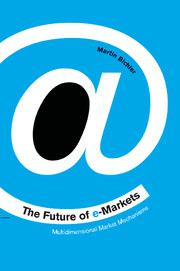Book contents
- Frontmatter
- Contents
- List of figures
- List of tables
- Preface
- Acknowledgments
- 1 Electronic Commerce and Electronic Marketplaces
- 2 Internet Marketplaces – A Technical Perspective
- 3 The Diffculty of Setting Prices
- 4 Methods for the Analyses and Design of Electronic Markets
- 5 Automated Negotiations – A Survey of State-of-the-Art Practices
- 6 Experimental Analysis of Multi-Attribute Auctions
- 7 Economic Models of Multi-Attribute Auctions
- 8 Conclusions and Perspectives
- Appendix: Utility Theory and Decision Analysis Techniques
- References
- Index
4 - Methods for the Analyses and Design of Electronic Markets
Published online by Cambridge University Press: 22 September 2009
- Frontmatter
- Contents
- List of figures
- List of tables
- Preface
- Acknowledgments
- 1 Electronic Commerce and Electronic Marketplaces
- 2 Internet Marketplaces – A Technical Perspective
- 3 The Diffculty of Setting Prices
- 4 Methods for the Analyses and Design of Electronic Markets
- 5 Automated Negotiations – A Survey of State-of-the-Art Practices
- 6 Experimental Analysis of Multi-Attribute Auctions
- 7 Economic Models of Multi-Attribute Auctions
- 8 Conclusions and Perspectives
- Appendix: Utility Theory and Decision Analysis Techniques
- References
- Index
Summary
As the opportunities for humans and software agents to interact increase, the mediating role of negotiation systems is becoming more important.
(Robinson and Volkov, 1998)Markets evolve, but they are also designed by entrepreneurs, economists, lawyers and engineers. Market design creates a meeting place for buyers and sellers and a format for transactions. Recently, economists and game theorists have begun to take a direct role and designed different kinds of market mechanisms.
An area in which market design is well developed is in the study of auction-based protocols. Although this is criticized by some authors (Kersten and Noronha, 1999a), auctions will be considered as a special type of negotiation. Leading economists such as Preston McAfee, John McMillan and Robert Wilson, among others, have successfully deployed game-theoretical analysis in order to design the bidding process in the case of the US Federal Communication Commission's (FCC) spectrum auctions as well as the design of energy markets. However, auction design is also an area in which there is a need to supplement the standard microeconomic theory.
Game theory is an important methodology, but it is not by any means the only technique necessary for successful market design. Market design practice is in its early stages and comprises methodologies such as equilibrium analysis, game theory, mechanism design theory, experimental economics, and computation. These techniques will be described in subsequent sections.
- Type
- Chapter
- Information
- The Future of e-MarketsMultidimensional Market Mechanisms, pp. 63 - 81Publisher: Cambridge University PressPrint publication year: 2001

